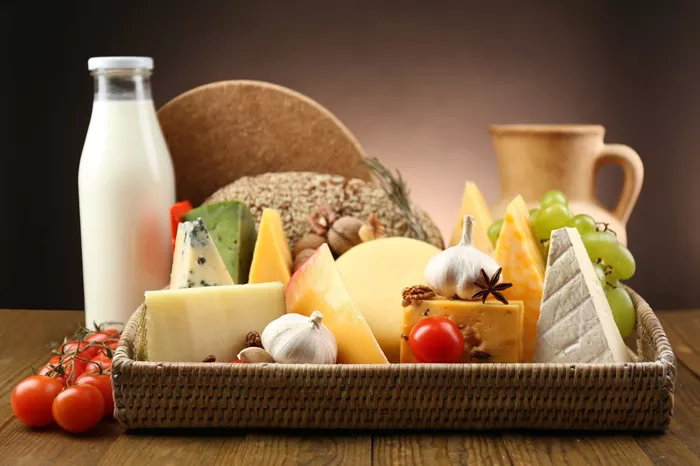Breastfeeding is a time when a mother’s diet directly impacts the health of her baby. The foods a mother consumes can affect the quality of her breast milk and, consequently, her baby’s health and well-being. Among various dietary considerations, cheese is a common topic of concern. This article will provide a comprehensive overview of which cheeses should be avoided while breastfeeding, explaining the reasons behind these recommendations and offering guidance on how to make safe choices.
Understanding the Impact of Cheese on Breastfeeding
Cheese is a source of essential nutrients, such as calcium, protein, and vitamins. However, some types of cheese can pose risks during breastfeeding due to their specific characteristics. Understanding these risks helps mothers make informed choices to ensure their baby’s health.
Cheese Types to Avoid
Soft Cheeses
Soft cheeses like Brie, Camembert, and Roquefort are made from unpasteurized milk. Unpasteurized milk can contain harmful bacteria, such as Listeria, which can cause serious infections in both mother and baby. While pasteurization kills these bacteria, soft cheeses made from unpasteurized milk should be avoided to reduce the risk of infection.
Brie and Camembert: These cheeses are known for their creamy texture and strong flavor. They are often made from unpasteurized milk, making them risky choices for breastfeeding mothers.
Roquefort: This blue cheese is another example of a soft cheese that may be made from unpasteurized milk. Its moldy appearance and strong flavor are indicators of its potential risk.
Blue Cheeses
Blue cheeses such as Gorgonzola, Stilton, and Roquefort are known for their distinctive blue or green veining caused by mold. These cheeses can harbor bacteria that might be harmful to breastfeeding mothers and their babies.
Gorgonzola and Stilton: These cheeses are known for their bold flavors and mold content. The mold can be a breeding ground for bacteria that might pose health risks.
Cheeses with Unpasteurized Milk
Unpasteurized cheeses can be particularly risky because pasteurization kills harmful bacteria. Cheeses made from raw milk, regardless of whether they are soft or hard, should be avoided.
Raw Milk Cheeses: Examples include some artisanal cheeses that are not pasteurized. These can include both soft and hard cheeses. Always check labels to ensure the cheese is made from pasteurized milk.
Cheeses with High Salt Content
High-salt cheeses can contribute to excessive sodium intake, which might not be ideal for a breastfeeding mother’s diet. Excessive salt can lead to dehydration and might affect milk production.
Feta and Processed Cheeses: Some feta varieties and processed cheeses contain high levels of sodium. These should be consumed in moderation to avoid potential issues.
Aged Cheeses
Aged cheeses like Parmesan and Asiago have been stored for longer periods, which can increase the risk of bacterial contamination if not handled properly. While they are generally made from pasteurized milk, their aging process can sometimes lead to higher bacterial levels.
Parmesan and Asiago: These cheeses, though often pasteurized, should be checked for proper handling and storage to minimize any risks.
SEE ALSO: Does Hot Chocolate Increase Breast Milk?
Why Avoid These Cheeses?
Risk of Listeria Infection
Listeria is a type of bacteria that can be particularly dangerous for breastfeeding mothers and their babies. It can cause listeriosis, a serious infection that might lead to complications like miscarriage, premature birth, or severe illness in newborns. Soft and blue cheeses made from unpasteurized milk are more likely to harbor Listeria.
Bacterial Contamination
Cheeses with mold or those made from raw milk can be breeding grounds for harmful bacteria. Even if the cheese is pasteurized, improper handling or storage can lead to bacterial contamination.
High Sodium Content
Excessive sodium intake can affect a breastfeeding mother’s hydration levels and overall health. It may also impact milk production and quality.
Possible Allergens
Some cheeses can be allergens for both mothers and babies. If a mother has a dairy allergy or intolerance, it’s crucial to avoid cheeses that might trigger reactions.
Safe Cheese Choices While Breastfeeding
Pasteurized Hard Cheeses
Hard cheeses made from pasteurized milk are generally safe for breastfeeding mothers. They have lower moisture content and are less likely to harbor harmful bacteria.
Cheddar and Gouda: These are examples of hard cheeses that are typically made from pasteurized milk and are lower in moisture. They are safer choices for breastfeeding mothers.
Low-Sodium Cheeses
Opt for cheeses with lower sodium content to reduce overall salt intake.
Ricotta and Cottage Cheese: These cheeses are often lower in sodium and can be a good alternative for breastfeeding mothers.
Fresh Cheeses
Fresh cheeses like mozzarella and cream cheese, when made from pasteurized milk, can be a safer option.
Mozzarella: Fresh mozzarella made from pasteurized milk is generally safe and has a lower risk of bacterial contamination.
How to Ensure Cheese Safety
Check Labels
Always check the labels to ensure that the cheese is made from pasteurized milk. This is the most straightforward way to avoid cheeses that might pose a risk.
Store Cheese Properly
Proper storage is crucial for preventing bacterial growth. Keep cheese refrigerated and avoid consuming cheese that has been left out at room temperature for extended periods.
Practice Good Hygiene
Use clean utensils and surfaces when handling cheese to prevent cross-contamination. Wash hands before and after handling food.
Consult with a Healthcare Provider
If you have any concerns about your diet or specific cheese choices, consult with a healthcare provider or a registered dietitian. They can offer personalized advice based on your health and dietary needs.
Conclusion
Choosing the right types of cheese while breastfeeding is important for ensuring the health and safety of both mother and baby. By avoiding soft cheeses made from unpasteurized milk, blue cheeses, high-sodium options, and unpasteurized cheeses, breastfeeding mothers can minimize potential risks. Opting for pasteurized hard cheeses, low-sodium options, and properly storing and handling cheese can help maintain a balanced and safe diet. Always consult with a healthcare provider for tailored dietary advice to support a healthy breastfeeding experience.


